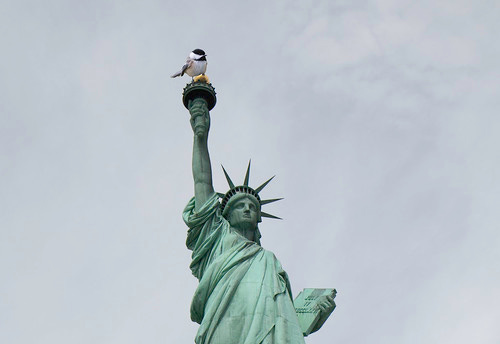A Truly Great American President
Americans didn't want a president who could "tell it like it is" in 1980 any more than they do today.
(Listen to the radio version here.)
Today is the perfect day to honor the man who was perhaps the most generous-spirited, morally upstanding, humble, and courageous American president of my lifetime. Jimmy Carter was also one of only four Presidents ever who were birders. The two Roosevelts were both members of the American Ornithologists’ Union and, before them, Thomas Jefferson was singularly well-educated about birds.

Not even I would say being a birder should be a prerequisite for public office, but birding opens us to places and experiences that enrich our perspective and give us a deeper understanding and appreciation of the natural world that we all depend on for our very survival.
President Carter doubled the size of the national park system and tripled the amount of federally protected wilderness. He signed the Superfund law, which created a way for the government to fund hazardous waste cleanups. He tried to block construction of more than a dozen expensive, environmentally destructive water infrastructure projects such as dams, canals and reservoirs which were at best only short-term solutions to long-term problems.

Jimmy Carter was the first president to talk about climate change, almost a half century ago. Soon after taking office, he ordered a major study of “probable changes in the world’s population, natural resources, and environment.” The final report from the White House Council on Environmental Quality warned that fossil fuel combustion could cause “widespread and pervasive changes in global climatic, economic, social, and agricultural patterns.” It suggested that we limit global temperature increases to 2 degrees Celsius above preindustrial levels — the goal eventually agreed to by nearly 200 nations.
Conserving energy is a no brainer whether you’re concerned about air and water pollution, dependence on the Middle East or international corporations, wildlife, human health, or climate change. In 1977, Carter signed the Department of Energy Organization Act, consolidating more than 30 separate energy functions carried out by various government agencies into one department, and throughout his term he kept a laser focus on energy issues. He maintained the 55-mph speed limit imposed by the Nixon Administration which Ford had continued, saving human and wildlife lives and fossil fuels as well, and in 1978, set fuel economy regulations (corporate average fuel economy, or “CAFE” standards) for passenger vehicles. The auto companies of course whined and complained, and eventually managed to get around them during the Reagan Administration by defining minivans and then SUVs as “light trucks” rather than passenger vehicles and putting the vast amount of their marketing and manufacturing into these bigger, less efficient vehicles.

Jimmy Carter said bringing down the cost of solar panels could be “a small part of one of the greatest and most exciting adventures ever undertaken by the American people.” In 1978, he spoke at what is now the National Renewable Energy Laboratory in Golden, Colorado, saying “Nobody can embargo sunlight. No cartel controls the sun. Its energy will not run out. It will not pollute the air; it will not poison our waters. It’s free from stench and smog.” He of course had solar panels installed on the White House.
Carter’s environmental policies were opposed by General Electric, General Motors, Exxon, and other corporations, their investors, and the politicians bought and paid for by them. That wouldn’t have mattered had not regular Americans lost interest in environmental issues. Carter’s presidency began and ended in the same decade that the Clean Air, Clean Water, and Endangered Species Acts had all passed by huge bipartisan majorities, but apparently Americans decided it was time to stop worrying about clean air and water for good.
As I recall, the media, beholden to corporations for advertising revenues and sponsorships, didn’t often directly undercut Carter’s environmental work—the vast support for environmental protection that decade still made them a little cautious—but from the very beginning they ridiculed his and Roslyn’s clothes, down-to-earth manners, and “country bumpkin” ways. After his inauguration, Carter, Roslyn, and their daughter Amy broke with longstanding tradition and walked along the Pennsylvania Avenue parade route rather than riding in a limo. Even though other presidents since then have done that, too, at the time I remember the media ridiculing him. His presidency never enjoyed even a momentary honeymoon with the Washington insiders or the American press.
Responsible adults know that a lot of our income must be invested in the future. We not only buy insurance against losses; we also do everything we can to prevent those losses in the first place. As soon as we took possession of our house, Russ and his dad, a retired electrician, completely upgraded our house’s wiring. We upgraded our oil furnace to the most efficient gas furnace as soon as we could, and when Russ realized the pipes into our house were lead, he immediately called the city and asked them to change the water line. It was well beyond our budget and we had to pay the entire cost, but keeping our baby and toddlers safe was far more important than discretionary spending. Grownups know there are times when we must tighten our belts.
A few years ago, we put a chunk of our savings and retirement funds into a heat pump. Even as we reduced our fossil fuel use, we’re paying more for winter heating now because electricity is far more expensive than gas. Our solar panels produce most of our electricity on sunny summer days and a significant chunk year-round, but even with rebates, we’re unlikely to ever make back in savings what we paid to buy and install them. And thanks to these major expenses, I’m unlikely to ever be able to afford a trip to Australia, Antarctica, or Africa. (The one time I went to Uganda, it was a freebie, called a “fam tour.”) Sometimes that makes me sad, but prioritizing what is truly important over what is personally enriching is what adults do.
Jimmy Carter is often lauded as the greatest ex-president we’ve ever had for his Nobel-Peace-Prize winning work in the Middle East; his protection of honest, democratic elections worldwide; and decades of labor for Habitat for Humanity. Yet his presidency itself is usually called a failure despite all the wild places, natural resources, and energy he saved, the huge environmental messes his Superfund program cleaned up, and the many more things he’d have accomplished with more support from Congress and the American public. Carter didn’t fail us. We failed him.
Those of us who say we want a president who “tells it like it is” and never lies should revere our 39th president like no other. But truth is not what Americans want to hear. They cast Carter aside for a myth maker whose first job was as a play-by-play radio sports announcer working in a studio while giving his listeners the impression that he was actually at the games he covered. As an actor, Reagan’s profession required him to pretend to be all kinds of things he wasn’t. As spokesman for General Electric, he learned to mouth corporate platitudes with a twinkle in his eye. He gave the appearance of being a gentle and wise “father knows best” kind of adult even as he eviscerated as many environmental protections as he could and literally trashed Carter’s solar panels on the White House.
Our choice in 1980 was a Daddy figure with crinkly eyes who could weave convincing tales about Santa Claus and the Tooth Fairy. Reagan simplified the concept of government spending as a family budget issue. Of course families, like government, need to economize, but Reagan’s enormous tax cuts for corporations and the wealthy were exactly like parents struggling to balance their family budget while happily asking the corporation they work for to cut their paycheck.
Carter’s failure was believing the American public truly wanted honesty and made decisions the way he did—based on deep-rooted and genuine Christian values and the best interests of his children and his children’s children. In 1980, Americans didn’t want an adult making wise adult decisions in the White House—we wanted Hollywood glitz. O what a falling off was there!








Thanks for the beautiful tribute to a great man!!